通用版 小学英语小升初语法课件-一般现在时课件(共16张PPT)
文档属性
| 名称 | 通用版 小学英语小升初语法课件-一般现在时课件(共16张PPT) | 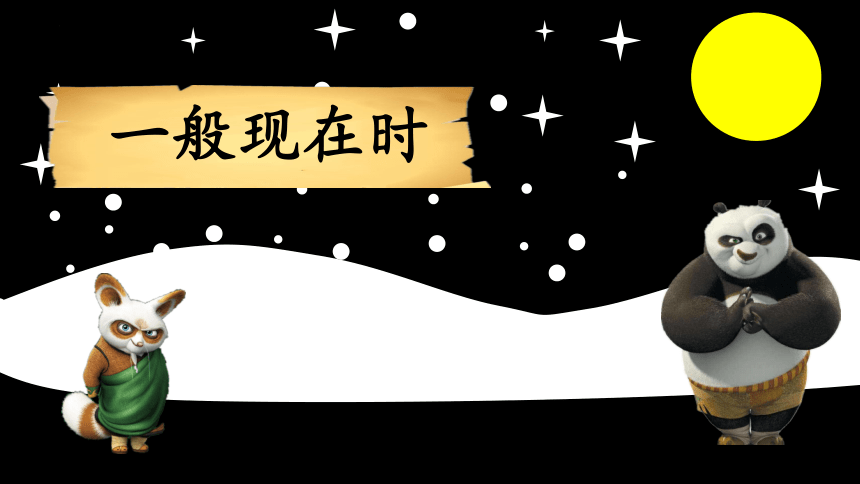 | |
| 格式 | pptx | ||
| 文件大小 | 3.4MB | ||
| 资源类型 | 试卷 | ||
| 版本资源 | 通用版 | ||
| 科目 | 英语 | ||
| 更新时间 | 2023-08-11 10:52:47 | ||
图片预览

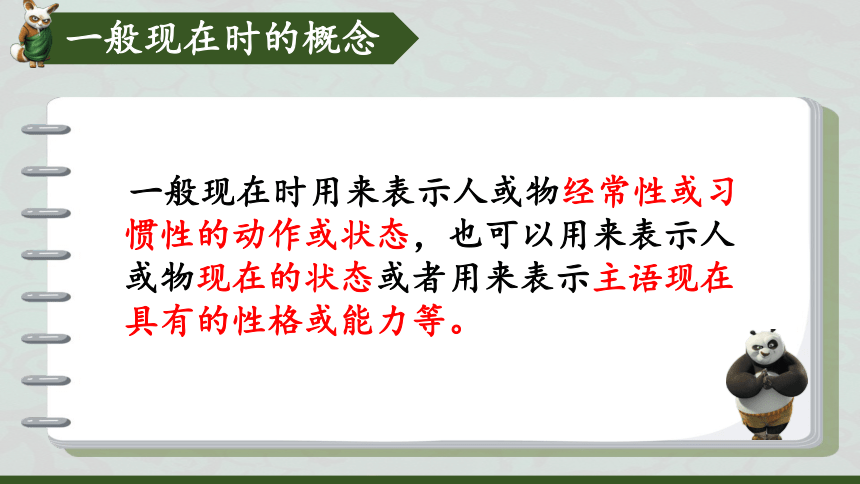
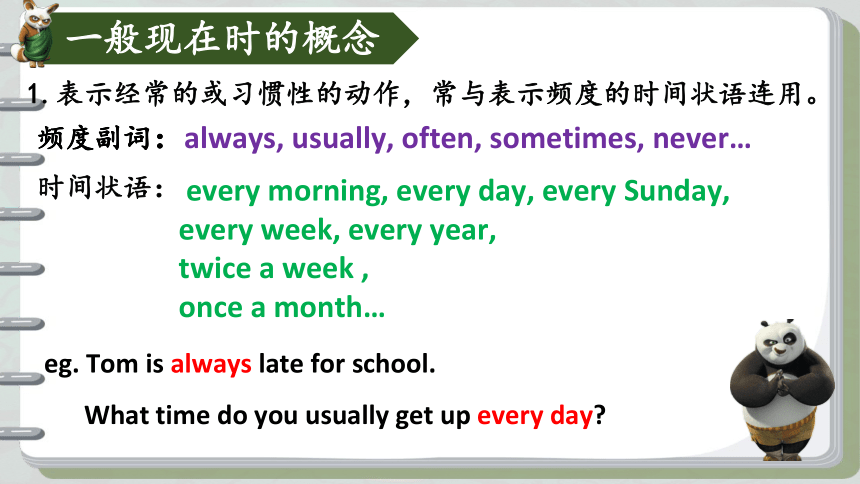
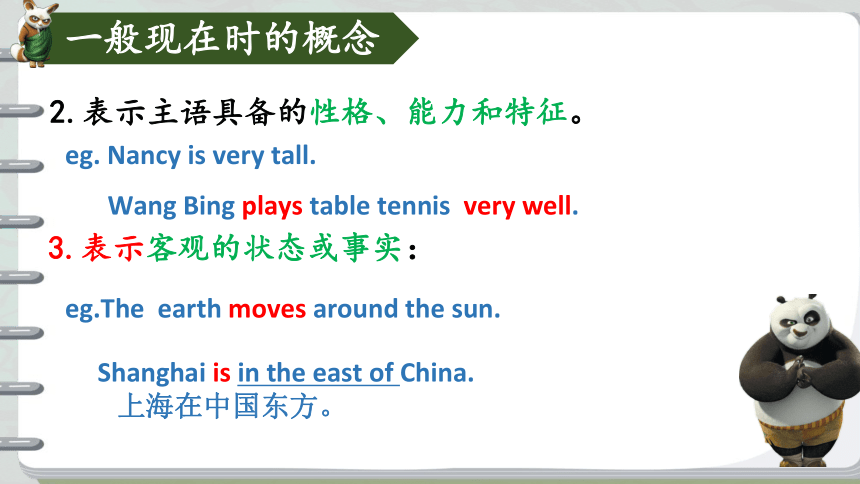
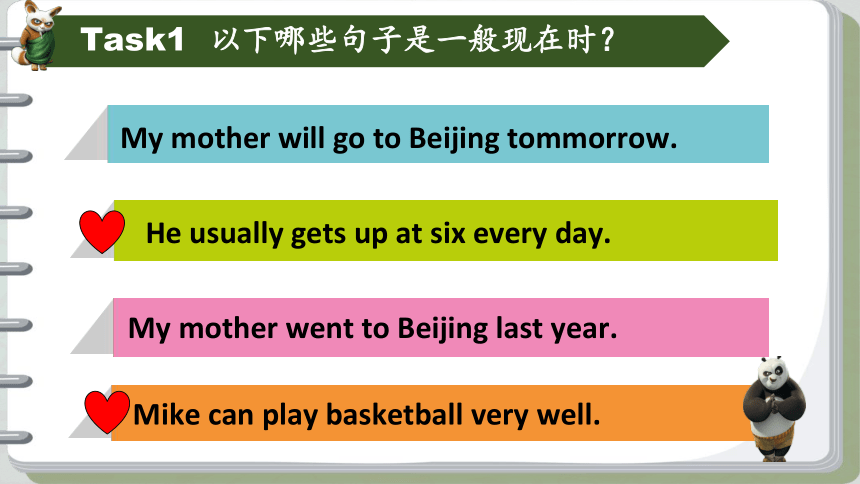
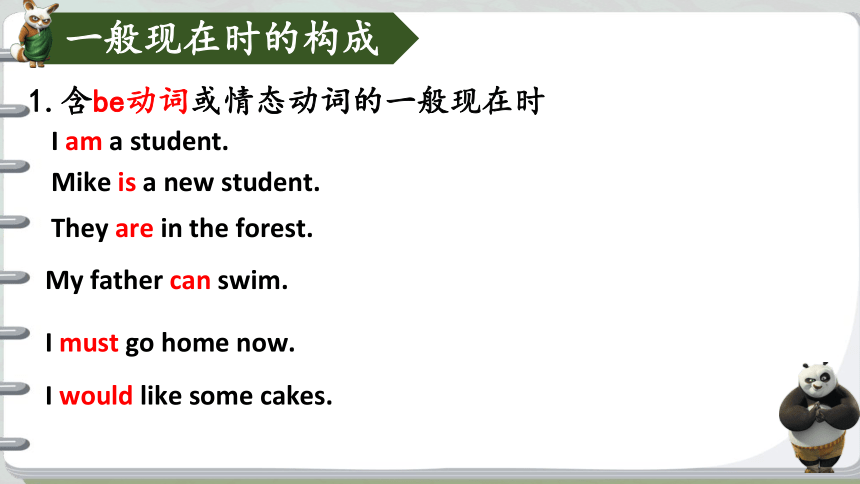
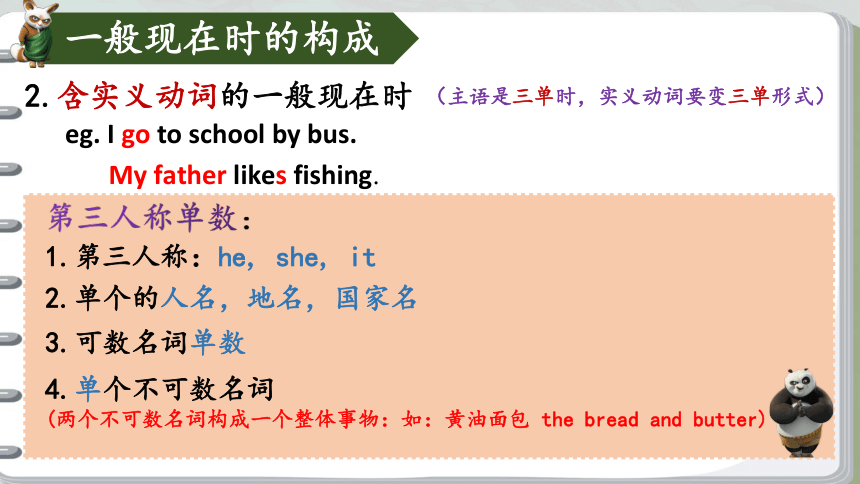
文档简介
(共16张PPT)
一般现在时
一般现在时的概念
一般现在时用来表示人或物经常性或习惯性的动作或状态,也可以用来表示人或物现在的状态或者用来表示主语现在具有的性格或能力等。
一般现在时的概念
1.表示经常的或习惯性的动作,常与表示频度的时间状语连用。
时间状语:
频度副词:
eg. Tom is always late for school.
What time do you usually get up every day
频度副词:always, usually, often, sometimes, never…
every morning, every day, every Sunday,
every week, every year,
twice a week ,
once a month…
一般现在时的概念
2.表示主语具备的性格、能力和特征。
eg. Nancy is very tall.
Wang Bing plays table tennis very well.
3.表示客观的状态或事实:
eg.The earth moves around the sun.
Shanghai is in the east of China.
上海在中国东方。
Task1 以下哪些句子是一般现在时?
He usually gets up at six every day.
Mike can play basketball very well.
My mother will go to Beijing tommorrow.
My mother went to Beijing last year.
一般现在时的构成
1.含be动词或情态动词的一般现在时
I am a student.
My father can swim.
Mike is a new student.
I must go home now.
I would like some cakes.
They are in the forest.
一般现在时的构成
2.含实义动词的一般现在时
My father likes fishing.
eg. I go to school by bus.
1.第三人称:he, she, it
2.单个的人名,地名,国家名
3.可数名词单数
4.单个不可数名词
(两个不可数名词构成一个整体事物:如:黄油面包 the bread and butter)
(主语是三单时,实义动词要变三单形式)
Task2 以下哪些是第三人称单数数?
my mother
the new student
the USA
Miss Li
the bread
the boys
his grandparents
Mike and Yang Ling
一般现在时的构成
2.含实义动词的一般现在时
实义动词变三单形式的变化规则:
1. 通常加s:like-likes cook-cooks play-plays
2. 以s,x,ch,sh结尾的动词,加es: watch-watches wash-washes
3. 以辅音字母加y结尾的动词,去y加ies
特殊情况:have-has be—is 是
如:study-studies try-tries carry-carries
(主语是三单时,实义动词要变三单形式)
去y加ies
C
末尾加es
B
末尾加s
A
Task3 以下动词变三单形式属于哪一种?
guess
特殊
D
stay
go
do
have
like
carry
try
cook
study
watch
fix
Task4 用所给词的适当形式填空
1. We often ______(play) on the playground at weekends.
2. He _________( get) up at six every day.
3. My father ___________ (brush) teeth twice a day.
4. The bread _________(look) nice.
5.Danny _____________(study) English, Chinese, math and art at school.
6.Mike sometimes ________(go) to the park with his sister.
play
gets
Do
brushes
looks
goes
brush
studies
一般现在时的句型转换
陈述句改一般疑问句:
2.当句中没有be动词和情态动词时,在句首加Do,主语是三单时加Does,动词变原形。
We have some dogs.
Does Mike like dogs
My father can swim.
Can your father swim
1.当句中含be动词或情态动词时,将它们提到句首。
I am a girl.
Are you a girl
Do you have any dogs
(第一人称变第二人称。通常some变any。)
Mike likes dogs.
I'd like some apples.
Would you like some apples
Task4 将下列句子改为一般疑问句
Tom is a doctor, too.
Mike can play football and basketball well.
There are some apples and pears.
I must go to school at seven.
Is Tom a doctor, too
Can Mike play football and basketball well
Are there any apples and pears
Must you go to school at seven
一般现在时的句型转换
陈述句改否定句:
2.当句中没有be动词和情态动词时,找到动词,在动词前面加don't,动词是三单形式时加doesn't,动词变原形。
We have some dogs.
Mike doesn't like dogs.
My father can swim.
My father can not swim.
1.当句中含be动词或情态动词时,在它们后面加not。
I am a student,too.
I am not a student, either.
We don't have any dogs.
(some变any,and变or, too变either)
Mike likes dogs.
My mother is a doctor, too.
Mike can play football and basketball well.
There are some apples and pears.
He goes to school at seven.
Task5 将下列句子改为否定句
My mother isn't a doctor, either.
Mike can't play football or basketball well.
There aren't any apples or pears.
He doesn't go to school at seven.
Thanks, Master.
I'll do more exercise.
Po, practice makes perfect.
You did a good job today!
一般现在时
一般现在时的概念
一般现在时用来表示人或物经常性或习惯性的动作或状态,也可以用来表示人或物现在的状态或者用来表示主语现在具有的性格或能力等。
一般现在时的概念
1.表示经常的或习惯性的动作,常与表示频度的时间状语连用。
时间状语:
频度副词:
eg. Tom is always late for school.
What time do you usually get up every day
频度副词:always, usually, often, sometimes, never…
every morning, every day, every Sunday,
every week, every year,
twice a week ,
once a month…
一般现在时的概念
2.表示主语具备的性格、能力和特征。
eg. Nancy is very tall.
Wang Bing plays table tennis very well.
3.表示客观的状态或事实:
eg.The earth moves around the sun.
Shanghai is in the east of China.
上海在中国东方。
Task1 以下哪些句子是一般现在时?
He usually gets up at six every day.
Mike can play basketball very well.
My mother will go to Beijing tommorrow.
My mother went to Beijing last year.
一般现在时的构成
1.含be动词或情态动词的一般现在时
I am a student.
My father can swim.
Mike is a new student.
I must go home now.
I would like some cakes.
They are in the forest.
一般现在时的构成
2.含实义动词的一般现在时
My father likes fishing.
eg. I go to school by bus.
1.第三人称:he, she, it
2.单个的人名,地名,国家名
3.可数名词单数
4.单个不可数名词
(两个不可数名词构成一个整体事物:如:黄油面包 the bread and butter)
(主语是三单时,实义动词要变三单形式)
Task2 以下哪些是第三人称单数数?
my mother
the new student
the USA
Miss Li
the bread
the boys
his grandparents
Mike and Yang Ling
一般现在时的构成
2.含实义动词的一般现在时
实义动词变三单形式的变化规则:
1. 通常加s:like-likes cook-cooks play-plays
2. 以s,x,ch,sh结尾的动词,加es: watch-watches wash-washes
3. 以辅音字母加y结尾的动词,去y加ies
特殊情况:have-has be—is 是
如:study-studies try-tries carry-carries
(主语是三单时,实义动词要变三单形式)
去y加ies
C
末尾加es
B
末尾加s
A
Task3 以下动词变三单形式属于哪一种?
guess
特殊
D
stay
go
do
have
like
carry
try
cook
study
watch
fix
Task4 用所给词的适当形式填空
1. We often ______(play) on the playground at weekends.
2. He _________( get) up at six every day.
3. My father ___________ (brush) teeth twice a day.
4. The bread _________(look) nice.
5.Danny _____________(study) English, Chinese, math and art at school.
6.Mike sometimes ________(go) to the park with his sister.
play
gets
Do
brushes
looks
goes
brush
studies
一般现在时的句型转换
陈述句改一般疑问句:
2.当句中没有be动词和情态动词时,在句首加Do,主语是三单时加Does,动词变原形。
We have some dogs.
Does Mike like dogs
My father can swim.
Can your father swim
1.当句中含be动词或情态动词时,将它们提到句首。
I am a girl.
Are you a girl
Do you have any dogs
(第一人称变第二人称。通常some变any。)
Mike likes dogs.
I'd like some apples.
Would you like some apples
Task4 将下列句子改为一般疑问句
Tom is a doctor, too.
Mike can play football and basketball well.
There are some apples and pears.
I must go to school at seven.
Is Tom a doctor, too
Can Mike play football and basketball well
Are there any apples and pears
Must you go to school at seven
一般现在时的句型转换
陈述句改否定句:
2.当句中没有be动词和情态动词时,找到动词,在动词前面加don't,动词是三单形式时加doesn't,动词变原形。
We have some dogs.
Mike doesn't like dogs.
My father can swim.
My father can not swim.
1.当句中含be动词或情态动词时,在它们后面加not。
I am a student,too.
I am not a student, either.
We don't have any dogs.
(some变any,and变or, too变either)
Mike likes dogs.
My mother is a doctor, too.
Mike can play football and basketball well.
There are some apples and pears.
He goes to school at seven.
Task5 将下列句子改为否定句
My mother isn't a doctor, either.
Mike can't play football or basketball well.
There aren't any apples or pears.
He doesn't go to school at seven.
Thanks, Master.
I'll do more exercise.
Po, practice makes perfect.
You did a good job today!
